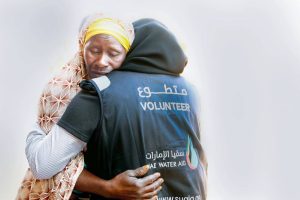Within cracked walls and corridors flooded with waste, Minaqil Teaching Hospital tries to survive, bearing witness to the tragic collapse of Sudan’s health sector and reflecting a deeper crisis caused by the ongoing war for two years.
The hospital suffers from a collapsing health and service environment, with no ambulances, piled-up waste, and water shortages, leaving over a million citizens facing a facility unable to perform its vital role.
Sudan’s health sector faces a catastrophic reality due to the armed conflict that erupted in mid-April 2023, destroying between 70% and 80% of medical facilities and most major pharmaceutical factories, while the remaining facilities are under severe pressure.
Out of 702 essential hospitals in Khartoum and other states, about 540 affiliated with the Ministry of Health, operating fully or partially, were vandalized, looted of medical devices, equipment, and networks.
The Ministry of Health estimates total losses in Sudan’s health sector at about 11.04 billion USD, including buildings, medical devices, furniture, ambulances, vehicles, medicines, and medical consumables.
During the recent period, amid the Rapid Support Forces’ seizure of wide parts of Khartoum, Wad Madani, Sennar, Dinder, and other cities, Minaqil Hospital faced huge pressure due to waves of displacement and increasing numbers of patients, forcing it to operate beyond capacity with limited resources.
Minaqil Teaching Hospital is the largest hospital in the West Gezira region and the only referral hospital, covering Minaqil and 24 Al-Qurashi localities and some peripheral areas of White Nile and Sennar states.
More than one million people benefit from its medical services, yet the hospital suffers significant deterioration in diagnostic and therapeutic services, environmental decline, and administrative failures caused by accumulated conflicts in Minaqil locality over previous years.
The hospital’s health environment has deteriorated over the years, making it unsuitable for sterilization and cleanliness standards; waste accumulates inside wards and the hospital yard, turning it into a disease hotspot instead of a treatment place. Patients complain about frequent toilet blockages, septic tanks, poor sanitation, and rat infestations exceeding patient numbers.
The health situation at Minaqil Hospital has reached a critical point, but civil efforts have emerged to renovate dilapidated buildings, rehabilitate intensive care and wards, and bring in new medical devices.
Upon inspecting the hospital’s health conditions, Dr. Osama Abdel Rahman, Minister of Health of Gezira State, pledged to solve the water problem radically by digging a well, providing tanks, and addressing sanitation issues.
In media statements recorded by “New Horizon,” the minister announced the provision of 150 mattresses and an environmental sanitation vehicle.
Dr. Moawiya Fadl Al-Mawla, General Director of Minaqil Teaching Hospital, said the hospital currently enjoys great stability and provides all health and therapeutic services in general surgery, orthopedics, internal medicine, and urology departments.
He pointed out starting the construction of the long-stalled women and maternity departments to offer comprehensive services soon.
He also noted the completion of work in the endoscopy, gastroenterology, liver departments, and the Schistosomiasis Research Center, the largest research center in Sudan, in addition to the oxygen plant producing about 4,000 tons daily to cover hospital needs in the state and neighboring states.
Dr. Fadl Al-Mawla explained that the emergency and accident department needs rehabilitation due to capacity increase, requiring the establishment of a converted clinic complex to solve the problem.
The hospital needs new specialists in urology, orthopedic surgery, and pediatrics, especially as the war affected the hospital’s sanitation and lack of inpatient beds.
He added, “We need radical solutions for all hospital problems, especially ambulance issues, as the hospital operates with only one ambulance.”
Fayadh Mahmoud, supervisor of the “Minaqil Lions” initiative for hospital rehabilitation and maintenance, said the initiative arose from awareness of the imminent danger and the deteriorating public health services, starting with beds, lighting, ventilation, and ward renovations.
Mahmoud told “New Horizon” that the volunteer initiative succeeded in rehabilitating and maintaining male internal medicine (two wards), male surgery (two wards), female surgery (two wards), intensive care, maternity, urology, orthopedics, accidents, and the military hospital.
He indicated that environmental sanitation at Minaqil Teaching Hospital included removing entrenched medical waste dumps and purchasing 1,000 medical waste bags, especially as the hospital produces about 2.5 tons daily of medical waste needing a special transport vehicle for rapid intervention.
He confirmed the hospital operates with one ambulance covering an area extending from south Khartoum to the road linking Rabak and Sennar cities, from Al-Hosh city to White Nile, and from Abu Qutta city to White Nile state southwards, all heavily relying on Minaqil Hospital, which needs more than six ambulances.
Mahmoud warned that Minaqil Hospital is swimming in a pool of sewage without drainage or septic tanks, with fermentation occurring inside old, dilapidated pipes and drains.
He confirmed that doctors’ housing also needs rehabilitation for the comfort of doctors and medical staff, especially as financial returns are weak, requiring attention to salaries and incentives.
The head of the initiative stressed the need for training and qualification courses for midwives, as they interact closely with the community, and called for developing the idea into workshops and seminars to deal with pregnant women and newborns.
He also emphasized the need to rehabilitate the blood bank, which requires three refrigerators, as it currently operates with only one insufficient refrigerator.
The initiative succeeded in rehabilitating 180 beds, providing 130 medical mattresses, full lighting for wards, and repainting all departments.
Behram Abdel Moneim – New Horizon













Recommended for you
Talib Al-Rifai Chronicles Kuwaiti Art Heritage in "Doukhi.. Tasaseem Al-Saba"
Exhibition City Completes About 80% of Preparations for the Damascus International Fair Launch
Unified Admission Applications Start Tuesday with 640 Students to be Accepted in Medicine
Egypt Post: We Have Over 10 Million Customers in Savings Accounts and Offer Daily, Monthly, and Annual Returns
His Highness Sheikh Isa bin Salman bin Hamad Al Khalifa Receives the United States Ambassador to the Kingdom of Bahrain
Al-Jaghbeer: The Industrial Sector Leads Economic Growth